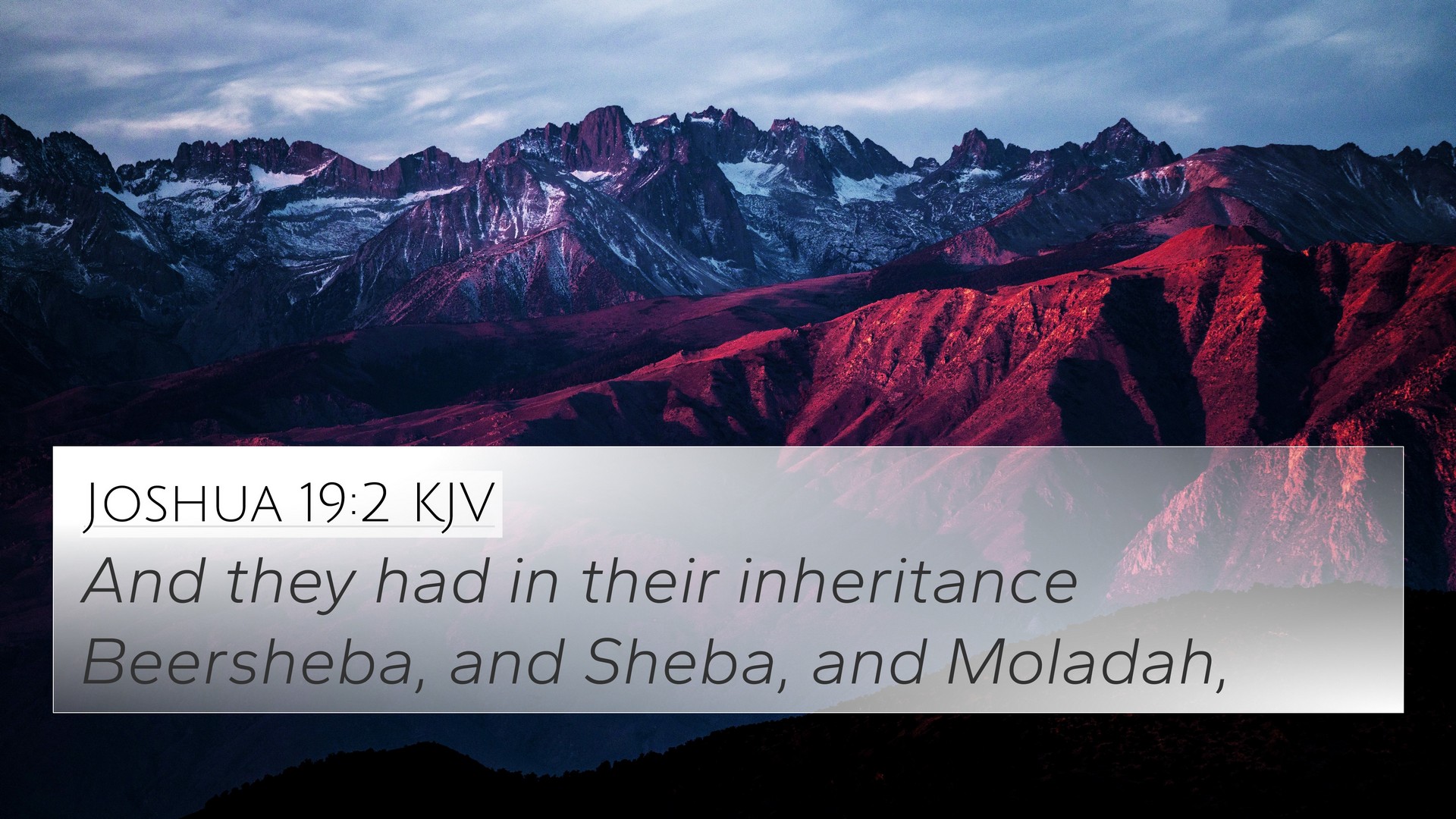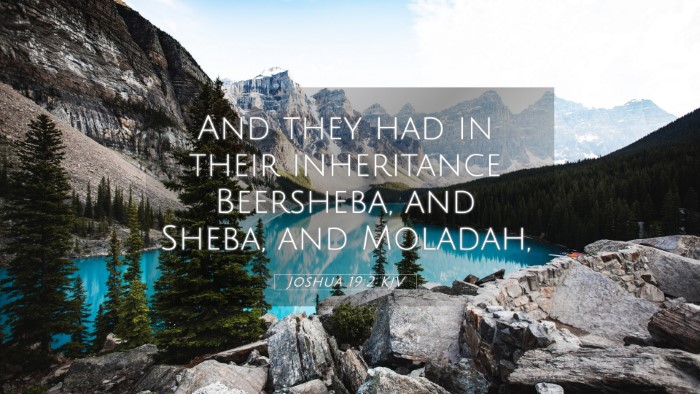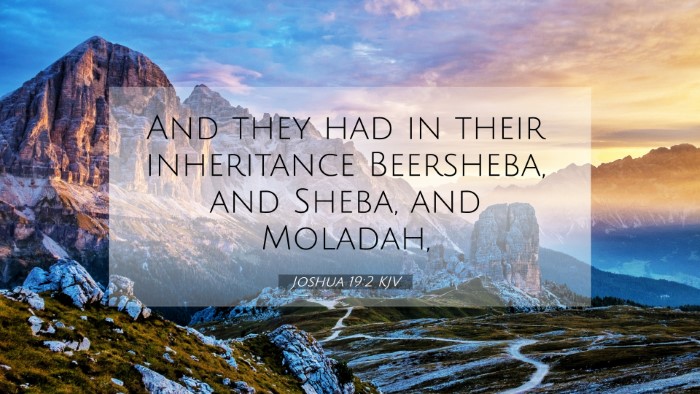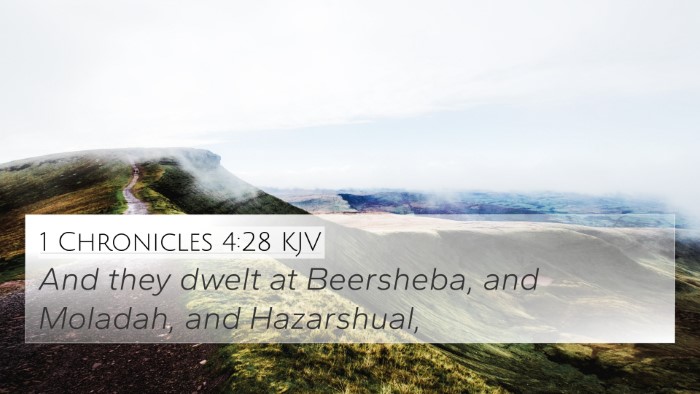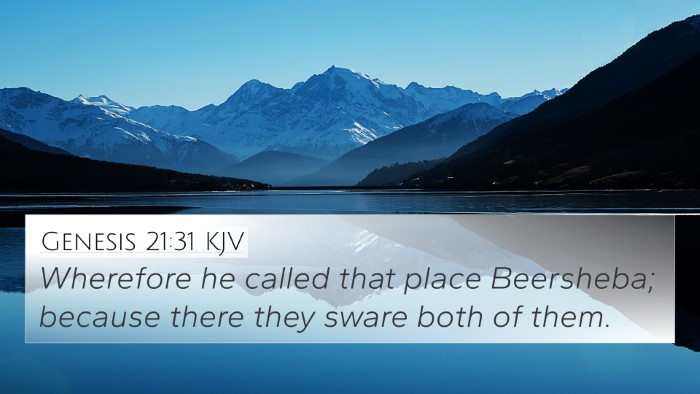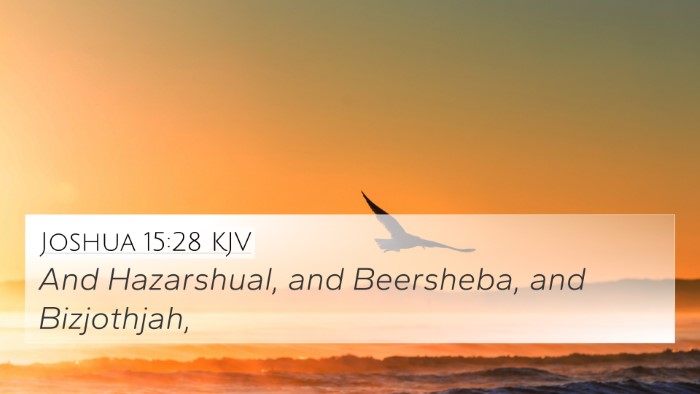Meaning of Joshua 19:2
Joshua 19:2 states, "And they had in their inheritance Beersheba, and Sheba, and Moladah,". This verse is part of the description of the allotment of the tribes of Israel, specifically the territory assigned to the tribe of Simeon.
Contextual Overview
The book of Joshua narrates the conquest and distribution of land among the tribes of Israel after their exodus from Egypt and passage through the wilderness. Chapter 19 details the allotment of land to various tribes, emphasizing the significance of each location mentioned in the inheritance.
Commentary Insights
Matthew Henry's Commentary
Matthew Henry notes that the mention of Beersheba, Sheba, and Moladah signifies the enduring providence of God in establishing Israel in the land of Canaan. He highlights Beersheba's historical significance as a city where the patriarchs, such as Abraham and Isaac, had encounters with God, suggesting a rich heritage for the tribe receiving this land.
Albert Barnes' Notes
Albert Barnes elaborates on the geographical locations listed in this verse, indicating that these places were significant not only for their physical positioning but also for their spiritual implications. Barnes suggests that the inheritance reflected the fulfillment of God's promise to Abraham and his descendants, establishing them firmly in the land.
Adam Clarke's Commentary
Adam Clarke emphasizes the sociopolitical implications of the inherited territories. He mentions that the allotment of land to Simeon among his brethren was a fulfilled promise and indicates a certain level of integration of the tribes. Clarke suggests that this unity signifies God's overarching plan for Israel as a nation.
Thematic Connections
This verse can be cross-referenced with various other parts of Scripture to better understand its implications and themes. The following connections help to showcase its relevance in the greater biblical narrative:
- Genesis 21:31 - The significance of Beersheba's name and its history in patriarchal narratives.
- Genesis 26:23-25 - Isaac's experiences in Beersheba parallel Israel's journey and divine encounters.
- Deuteronomy 33:6 - Moses blesses Simeon, connecting Simeon’s land inheritance with his role in Israel.
- Revelation 7:7 - Simeon's mention in the list of tribes signifies God’s inclusiveness in salvation history.
- Numbers 26:12-14 - The census and divisions of tribes illustrate the fulfillment of God's promises through these inheritances.
- Amos 5:5 - Reference to the places in the land as signs of Israel’s identity and legacy.
- Hebrews 11:9 - The land promised to Abraham connects the patriarchs to the land allocations in Joshua.
Cross-Referencing Biblical Texts
Understanding Joshua 19:2 proves integral for those engaging in cross-referencing efforts. Here are essential tools and concepts beneficial for further study:
Tools for Bible Cross-Referencing
- Bible Concordance: Helps locate words and themes throughout Scripture, essential for comparative Bible verse analysis.
- Bible Cross-Reference Guide: Provides structured insights into linking Bible scriptures across different books.
- Cross-Reference Bible Study: Encourages thematic Bible verse connections through careful comparison.
- Understanding Inter-Biblical Dialogue: This includes identifying connections between Old and New Testament scriptures.
Further Study Suggestions
For deeper exploration of the significance of this passage, consider these questions:
- What verses are related to Joshua 19:2 in the context of divine promises?
- How does the inheritance of the land contribute to understanding God’s plan for Israel?
- What are the implications of Beersheba in the narratives of Abraham and Isaac?
- What parallels can be drawn between the allocations in Joshua and the themes found in the New Testament?
Conclusion
Joshua 19:2 serves as a vital link within the broader narrative of the Israelites' journey and portrayals of God's promises. Through the insights provided by various commentators, along with the interconnections made with different biblical texts, one can gain a deeper understanding of the intricate design of redemption woven throughout the Scriptures.
